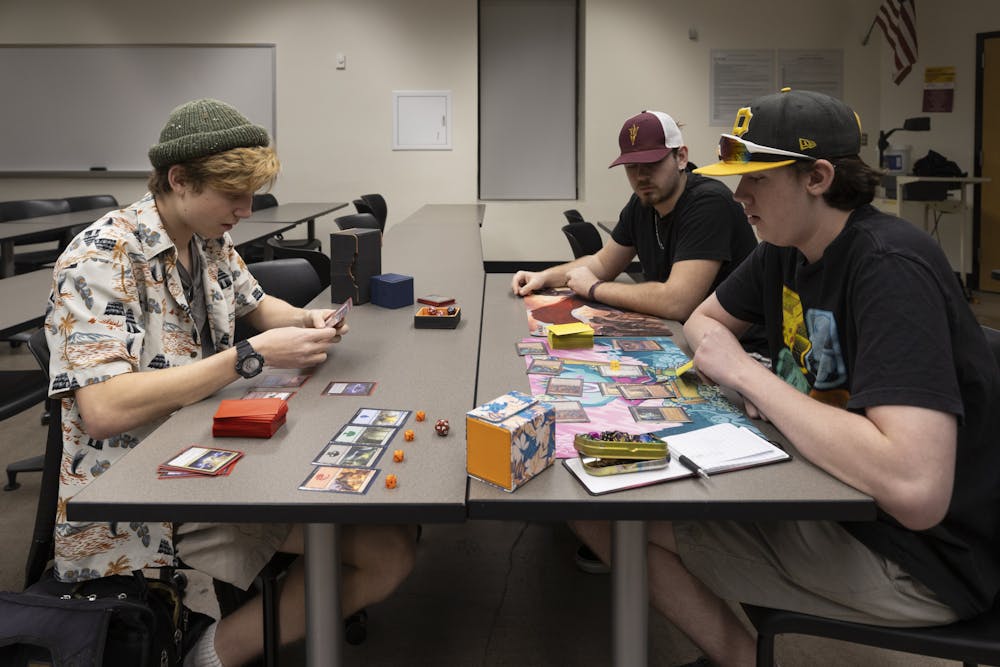Students packed Primetime Games in Tempe for a special off-campus Trading Card Game Club meeting on Wednesday, Nov. 1. As the meeting commenced, players laughed, built their decks of "Magic: The Gathering" cards and decompressed from the long school day.
For some attendants, "Magic: The Gathering," "Yu-Gi-Oh!" and other trading card games bring them back to memories of collecting and playing as a child. Other players discovered the world of trading cards online and have found connections through the in-person community at ASU.
Back in the day
Connor Gurley, the Trading Card Game Club president and a senior studying media arts and sciences, said he started playing "Yu-Gi-Oh!" on his Nintendo DS when he was between 8 and 9 years old and began collecting cards soon after.
"As a kid, you have a greater enjoyment for the game because you don’t know about optimization or the proper stack management," Gurley said, referring to some of the more technical skills of trading card games like "Yu-Gi-Oh!".
"We found a box of cards near the trash can and we opened it up and started to play, making our own rules up back in the 90s," said Frank Rye, an ASU alumnus and the former owner of Primetime Games. "Trading cards allows people to have a space where they can kind of be themselves and feel comfortable doing the hobby they like to do."
Dylan Schultze, a junior studying film and media production, started playing "Magic: The Gathering" in seventh grade.
"Before I even knew the formats or anything, we'd have a random amount of cards for the deck," Schultze said. "We played however we wanted, basically."
Then, he started to go and learn rules and techniques at local game shops.
From the online arena
Nowadays, Schultze mainly finds time to play trading card games using online platforms.
He used MTG Arena, a popular online game platform for "Magic: The Gathering," to teach Isabelle Haase, a junior studying aerospace engineering, how to play.
"A lot of it is automated, so it's easier to learn that way, and less stressful," Haase said.
Once she knew the basics, she started attending Trading Card Game Club meetings with Schultze.
Though online arenas are accessible and a good teaching tool, Schultze said he vastly prefers playing with paper and finds the physical aspects "very satisfying."
READ MORE: Dungeons & downtime: how tabletop roleplaying games benefit college students
Unlike Rye and Schultze, Fae Valentine, a sophomore studying English literature, began playing "Magic: The Gathering Online" after coming across YouTube videos of matches. Now though, Valentine only plays in person.
"(Playing) online makes deck-building easier because you don't have to buy cards and wait for them to get shipped to you," Valentine said. "But it's not the same. You don't have the same level of human interaction (online) ... I just prefer in-person, where we can interact and make jokes."
Putting cards in the hands of students
The Trading Card Game Club at ASU works to dissolve financial barriers of collecting and deck-building by applying for funds from the Undergraduate Student Government to buy packs of cards.
At a meeting like Wednesday night's, some players participate in a draft, where the club president distributes the packs of cards free to members. Club members take turns building their decks with the best cards to play with that evening. Match winners walk away with prizes — usually more cards.
"As a member of the club, you can just show up and enjoy," Gurley said. "And you know we've already handled the financial side of it."
Of course, players are also welcome to use their own collection of cards, and many players have invested in rare and powerful cards with unique abilities.
No matter the cards or skill level of the player, the club welcomes everyone.
"I feel like it's like a community that you don't really know about until you play," Haase said.
Edited by Grey Gartin, Sadie Buggle and Caera Learmonth.
Reach the reporter at spbracci@asu.edu and follow @SophiaBraccio on X.
Like The State Press on Facebook and follow @statepress on X.
Sophia is a senior studying journalism and mass communication. This is her sixth semester with The State Press. She has also worked at Nomads with Notebooks and Blaze Radio and interned for The Arizona Republic.




